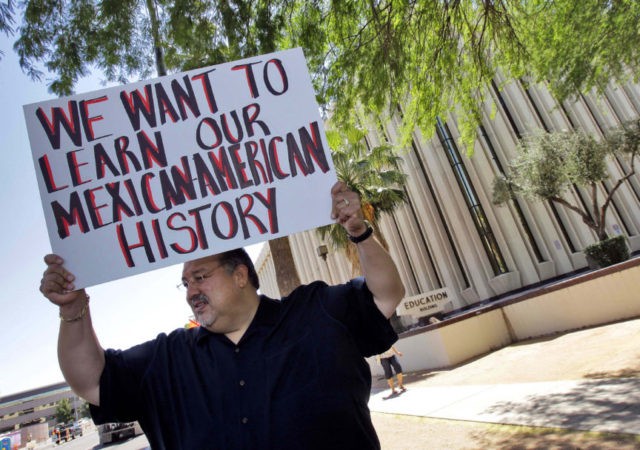The Texas State Board of Education (SBOE) meets this week in Austin to vote on a textbook for a Mexican American Studies (MAS) high school elective.
However, the state’s expert review panel found egregious flaws and factual errors throughout the submitted work and already advised against its adoption.
Last year, the SBOE rejected another MAS contender, Mexican American Heritage, submitted by Momentum Instruction. Breitbart Texas reported that MAS activists accused the textbook of being “error-filled” and “racist.” They sought to discredit the publisher’s CEO, Cynthia Dunbar, a former SBOE member of Native American descent, as a “conservative ideologue.”
One of Dunbar’s fiercest critics, Tony Diaz, a MAS activist, authored this year’s sole submission, The Mexican American Studies Toolkit, from Kendall Hunt Publishing. In 260 pages, Diaz presents material in a style indicative of a personal narrative or commentary, toggling between the first and third person, even quoting himself. He punctuates his points with essays, a number of them self-scribed. Diaz also recounts the hit campaign against Dunbar’s textbook.
An associate professor of English at Lone Star Community College in Houston, Diaz shares very strongly held views on topics from “identity” to “immigration” in the textbook. Sympathetic to DREAMers, he refers to the President as “anti-immigration Trump,” and the elected officials he hopes will embrace his textbook as the “majority Anglo Republican board.”
Breitbart Texas reported that, in 2012, Diaz, the self-proclaimed “Librotraficante,” which means “book trafficker,” smuggled banned books into Phoenix to raise funds for Occupied America, one of the inflammatory books that was part of the incendiary MAS curriculum in the Tucson Unified School District, which the Arizona Department of Education shut down. The “toolkit” devotes an entire section to the work of librotraficantes and politicizes the Tucson MAS program repeatedly, all part of the author’s struggle for ethnic studies.
In reviewing the textbook, the state’s experts identified 12 pages of factual errors and addressed content flaws in nine additional pages of comments. They wrote that a “grave lack of historical context prevents a thorough understanding of the social, political, and economic factors shaping the Mexican and Mexican American experience.” They said the “toolkit” needed “substantial revisions.”
The academic panelists also underscored that the textbook “does not cultivate and nurture social studies skills required by the state.” They commented that “the author claims to present teachers with the most ‘up-to-date’ approach to contemporary issues…’ However, upon review of the content, the panel agrees that teachers will have to heavily supplement the material with additional secondary and primary sources to fill the numerous historical voids.”
These reviewers pointed out that Social Studies textbooks do not use the first-person in the narrative. “The informal tone and language of the book reads antagonistically preventing a nuanced understanding of the multidisciplinary development and scope of the field,” they commented, noting it “does not allow for the development of analytical and critical thinking skills in students.”
Ultimately, the experts stated: “The panel has collectively come to the conclusion to not recommend the adoption of The Mexican American Studies Toolkit as it stands.”
A new Texas law requires that all instructional and supplemental materials must be free from factual errors, suitable for the subject and grade level for which the material was submitted, and reviewed by academic experts in the subject and grade level for which the materials are intended.
A textbook also must meet at least 50 percent of the state standards, the Texas Essential Knowledge and Skills (TEKS) and 100 percent of the English Language Proficiency Standards (ELPS). The academic review panel reported that Diaz’s textbook barely crossed over that threshold, meeting 52 percent of the TEKS. It met 100 percent of the ELPS.
On Friday, Diaz inked “It’s Time, Texas. Call, Testify, or Rally for Mexican American Studies” for the Huffington Post, telling readers to “share this as a source for talking points” and “use any lines or phrases for their testimony” to support his textbook submission.
He cited a 2012 report, “An Empirical Analysis of Mexican American Studies Participation on Student Achievement within Tucson Unified School District,“ spearheaded by University of Arizona professor and Latino activist Nolan Cabrera. It presented stellar findings: 108 percent of Tucson USD MAS enrolled students were more likely to graduate and 144 percent more likely to pass standardized math and writing tests.
However, Diaz never mentioned a 2009 study commissioned by the Arizona Department of Education, “The Effect of Tucson Unified Ethnic (‘Raza’) Studies on Student Achievement.” It debunked such achievement claims, finding “no significant impact either statistically or practically, of taking ethnic studies courses.” At the time, MAS advocates claimed a 97 percent high school graduation rate but the study revealed a 79 percent rate. The Arizona Republic reported: “No peer-reviewed, academically valid research ever has found that politically inspired, race-based courses cause student to take their studies more seriously and go to college.”
Interestingly, on Friday evening, new “toolkit” content posted to the Texas Education Agency’s Proclamation 2018 webpage. Diaz withdrew his essay Mexicans Ain’t White: The Gus Garcia Story and replaced it with his opinion piece on the court overturning the Arizona MAS ban. This adds 107 pages of unvetted textbook material days before the SBOE will vote on whether or not to adopt the “toolkit.”
The board begins hearing public testimony Tuesday.
Follow Merrill Hope, a member of the original Breitbart Texas team, on Twitter.

COMMENTS
Please let us know if you're having issues with commenting.